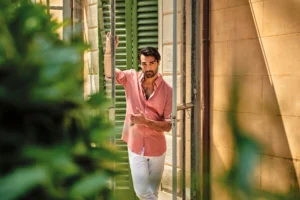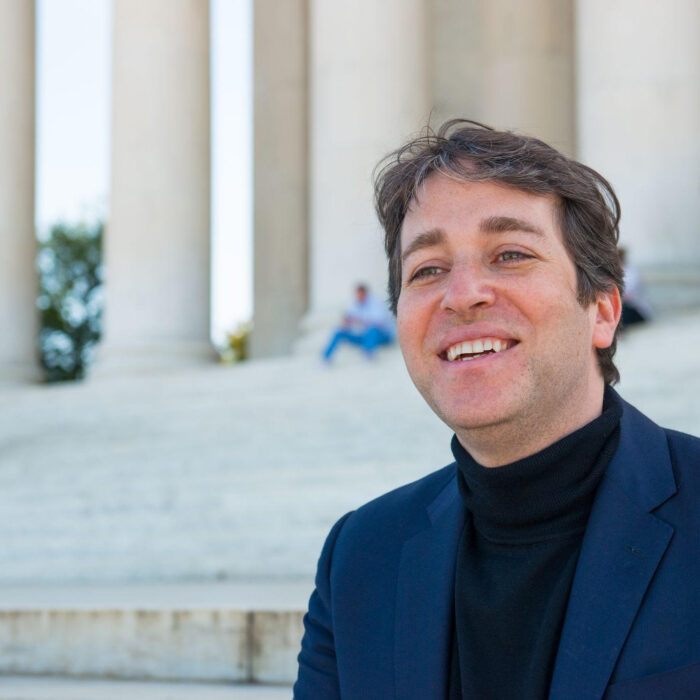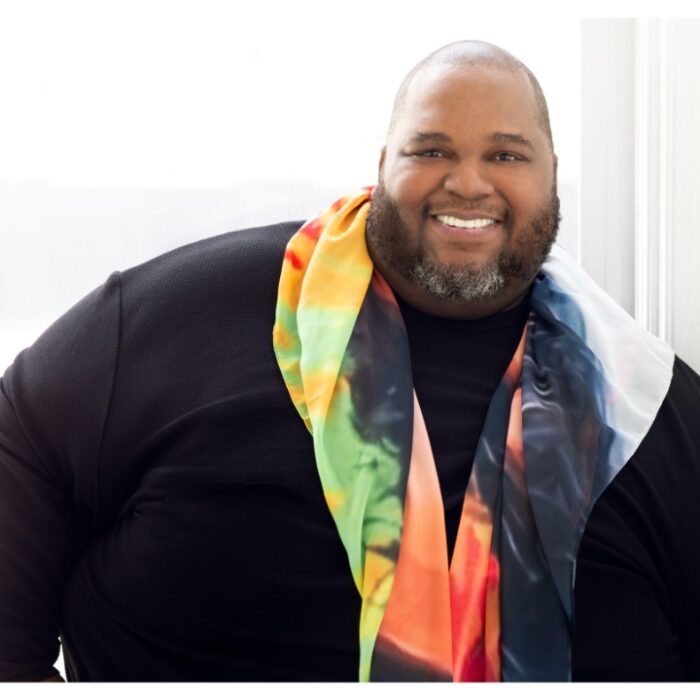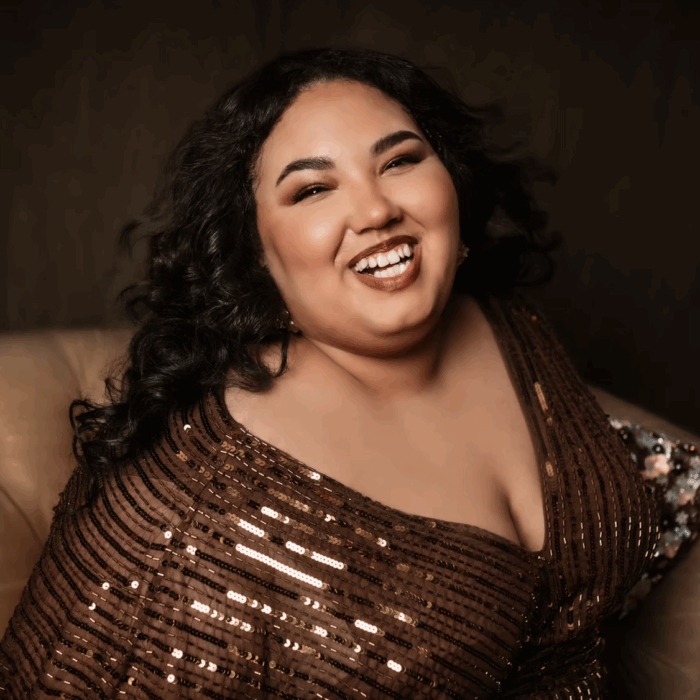
Q & A: Jonathan Tetelman on Returning to Carnegie Hall, Crossover & Performing With Yankees Legend Bernie Williams
By Francisco Salazar(Photo: ©BenWolf)
On Jan. 13, 2026, tenor Jonathan Tetelman will join guitarist and Yankees legend Bernie Williams for a special Carnegie Hall concert.
The evening will blend classical, Latin, and jazz music and will feature special guests that include Mets legend José Reyes, Knicks icon Stephon Marbury, and Metropolitan Opera artists. The concert will be hosted by Emmy Award-winning journalist Darren Rovell and will celebrate the intersection of arts and athletics in a night of music, storytelling, and New York Pride.
Tetelman, who is producing the concert with Williams, has become one of the leading tenors in the world singing at some of the great houses and performing some of most difficult tenor roles in the repertoire. But as he continues to grow in stature, Tetelman isn’t only interested in growing his operatic repertoire, he is also interested in bringing new audiences to classical music with concerts like these.
OperaWire spoke to the tenor about the upcoming concert, his plans for the series and why crossover can be helpful to bringing audiences to the opera.
OperaWire: How did you get involved, and how did this project with Bernie Williams come about?
Jonathan Tetelman: Well, it’s actually through my friend Adam Unger, who is actually the best man in my wedding. We became close friends maybe a decade ago, and it was his dream about 13 years ago. He approached Jonas Kaufman about it, and Jonas didn’t really know who Bernie Williams was, so he was like, probably not. So it had to wait 13 years to come to my plate. And then my profile grew enough, so he asked me, and then I said that sounds like a really cool concept.
It wasn’t originally supposed to be in any venue. It was actually a part of the business of All Star Encore Company, and we pitched it to a couple of places, and we decided that Carnegie would be the most worthwhile place to do it for the first time.
OW: Will this be your Carnegie Hall debut, or have you performed there before?
JT: I sang there as a boy soprano a bunch of times, and then I did one Coronation Mass, but the tenor part in that is pretty limited and that was almost 10 years ago. So this is my real kind of solo debut.
OW: Why is it important to team up with more crossover artists, especially for opera singers?
JT: I think it’s something that opera needs. I think it’s a facelift. I think it’s something that’s going to attract new people. I think kind of doing the same thing over and over again, maybe doing some cameos at these opera houses is interesting, but that’s only interesting to opera people.
I think you have to open the doors to people who don’t know anything about opera, who would never consider going to an opera. And I think the concert stage is definitely the gateway.
Actually, after doing a lot of concerts in Europe, I’ve gained a lot of audience who don’t go to the opera. They’re like, we’re interested now in hearing opera and maybe seeing you in an opera because we’ve seen you on the concert stage, because it’s just more approachable. For some people, the whole thing about going to the opera, dressing up, you know, there’s all this kind of Stigma about what it means to go to an opera, and in a concert hall, it’s a little different. It’s a little bit more relaxed, and I think this is a good way to just get people’s ear on what we do.
OW: It’s very rare to see you in the States. So this is a chance to see you in New York.
JT: Well, I think ever since I was a boy soprano, it has been a big goal of mine, a dream to sing a concert at Carnegie Hall, that’s my own. That’s really something I’ve always wanted to do. But then coming back to New York is a rare thing that my family, the audience here, and my friends get to hear me, and doing it in New York, it’s always wonderful that they get that chance.
Of course, I’m doing things in D.C., Dallas, and Houston. So I’m in and out of the United States.
But right now, my position at the Met is a little hesitant. I didn’t really feel like it was the right place for me. Maybe it was also not the right time, not the right role, but I just didn’t feel like that was the direction I wanted to go. And now with this Carnegie show, I feel like I can show something that I wasn’t able to show there.
OW: What kind of repertoire can audiences expect from this concert?
JT: We’re gonna do some opera repertoire, like “E Lucevan le Stelle,” some Verdi and Neapolitan songs. We’re then going to move into jazz, Gershwin, Bernstein.
Bernie’s gonna play a couple of his pieces. We’re also going to do a bit of Latin music because that’s a kind of a crossover for us. And then we’ll finish it out with Frank Sinatra and “Volare.” We want people to feel like they can get up and dance in the aisles.
We wanted to encompass that feeling of like you’re hearing classical, great classical music, and then it goes into something that whatever the energy is, we want to just let it be.
OW: You just did the Pavarotti 90th Gala. I was watching some of the videos and it was interesting because I was expecting a more classical oriented concert. What I ended up seeing was more popular music with a lot of popular artists and opera singers doing more crossover artists. How was that experience and how do you feel the audience responded to it?
JT: I think it was a big mix. I know they sold out and unfortunately we had torrential rain halfway through so that kind of put an end to the fun. But I think they programmed it how Pavarotti wanted it programmed. I think he would have wanted it to be something for everyone.
I think you had the Volos, you had the Bocellis, you had Grigolo, you had all these guys that can sing both things. I even did a piece with Angela and it was cool to see that people want to hear the opera and then they also want to hear the other things and they appreciate it. But I think mixing these things in concert is the way to keep the audience entertained.
OW: As an opera singer, would this be something that you hope to be able to do more often? A lot of opera aficionados would criticize a singer for attempting to do all of these crossovers. Do you think that the criticism is valid or do you think that it’s just because they’re trying to maintain a barrier?
JT: I think there is value to their criticism, but I think to be a complete artist, you have to be a complete artist. I think that Enrico Caruso didn’t really care about what his reviewers were saying about him, being a popular person at the time. That was popular music at the time, and now we have popular music that’s a little bit different.
But the art, in itself, is the communication of your instrument. I think if you’re able to communicate your instrument in a classical way, if it’s opera, then it’s acoustic. You have to be able to do things that project your voice and things that communicate emotion and all those things.
But if you’re doing that, then you still remain a classical musician, whether you perform this or you perform that. It’s just a difference of venue. It’s a difference of repertoire.
OW: What do you hope that audiences get from this performance what is your plan for the concert?
Well, right now there is another concert being offered in Miami. I think that I would like to see it incorporating a symphony and making it broader in terms of classical repertoire. Right now we have just a jazz ensemble and a small string quartet because because we’re funding it ourselves.
But if we had something like the Chicago Symphony, we could really do operetta and we could do things that have a much bigger reach and are more interesting, in terms of the way we can incorporate the sound. It can have a little more depth, like what we like to hear at a concert house.
But what I would really like to see for this is some sort of series. I think it could be cool to turn this into a cameo thing with different athletes performing with different top tier musicians on television. And it could be really exciting to just watch that. And that’s how you really reach the people. You can reach people in their living room and they don’t have to go anywhere.
They can hear this music and be like, wow, what aria is that? What’s an aria? And they’re like, “that’s so cool.”
And you could potentially get people to come to the opera. I think that reaching them from their home can be even more powerful. And that’s what Pavarotti did too.
OW: As a recording artist, do you think this project could be recorded on something like Deutsche Grammophon? Or on another label?
JT: I think so. I think it probably wouldn’t go on their label. I’m not sure that that is the right label for it. It would need to go on a bigger more distributable label. I would assume maybe Universal themselves would be interested in something like that because you just need a budget and it’s also harder to plan because these athletes, are doing their philanthropy and doing their music and other things.
And it’s hard to get people into a studio together that are from different walks of life and different parts of it. I actually see this as like a “Dancing with the Stars” kind of thing. And I think that there’s a place for music on the stage that is for everyone.
OW: Social Media has become an important tool for artists in today’s opera landscape. Do you think that it actually does something to bring the audience into the house?
JT: I think that there is a return. I think there is, even it does not sell a thousand tickets, it might sell 10 to 20 to 50 tickets of people. We get messages all the time telling us “I just bought a ticket to Carnegie, I just bought a ticket to your concert in ElbPhilharmonie. I’m coming to the opera.”
I think that that’s a way of communicating with the artist directly. Back in the day, it was postcards or mail or just signing your signature at the door. I think that social media is a way to connect you directly to an artist.
That was never available before, and I think it does work. I think it just needs to be curated.
I may put a lot of “Nessun Dormas” up but that’s the thing that people, when they wake up in the morning and they hear it, they’re just like, wow, that feels good. You know, I feel that. I feel that connection to this person and I’m gonna write to them, “thank you so much. You made my day.” And for them, that really makes them feel something about this music that they wouldn’t normally have.
I think that that’s really the power of social media. You can touch someone from all over the world and they’ll feel it, and then hopefully they’ll say, “hey, I want to go and hear that live.”
OW: What are some of the other interesting projects that you are excited about in the coming months?
JT: Actually. I have an interesting kind of eclectic work. I think that if you want to have that artist profile around you, you need to do things that are not, just in this and just in that. Last year, I did my ElbPhilharmonie debut, and I’ve recently got connected with Anna Handler. She just made her Tanglewood debut and she’s really close with John Williams. So she did a concert in LA and made her Hollywood Ball debut.
So we’re doing an interesting project called an “enigma performance.” It will be an ensemble that she’s kind of formulating together, and we’re doing a little bit of opera with this ensemble, but its going to be kind of set up in a way that it’s like baroque. So there’s going to be, like, a jam in the middle of this music, and then we’ll do some Wagner songs. I would like to do maybe a Petrarca song with this kind of different sound. We have plans and we’re gonna rehearse for a while and see what kind works for it.
There may be Neapolitan Canzone, which would also fit this, because it just has, this different flavor, and maybe even Fauré songs. I want to try and just play and have fun and, try different feelings and different vibes. I think that’s also a cool project we have coming up.


